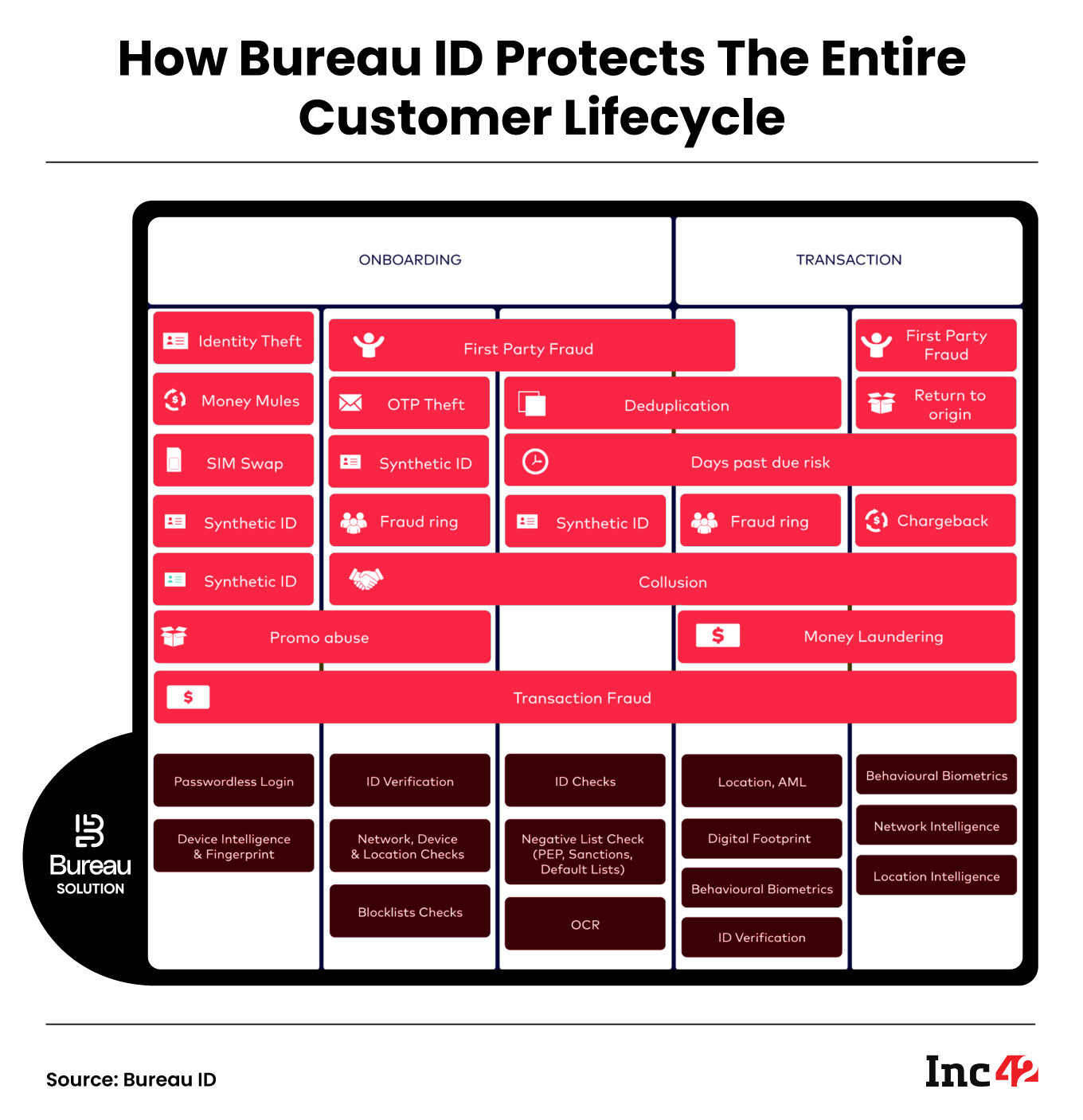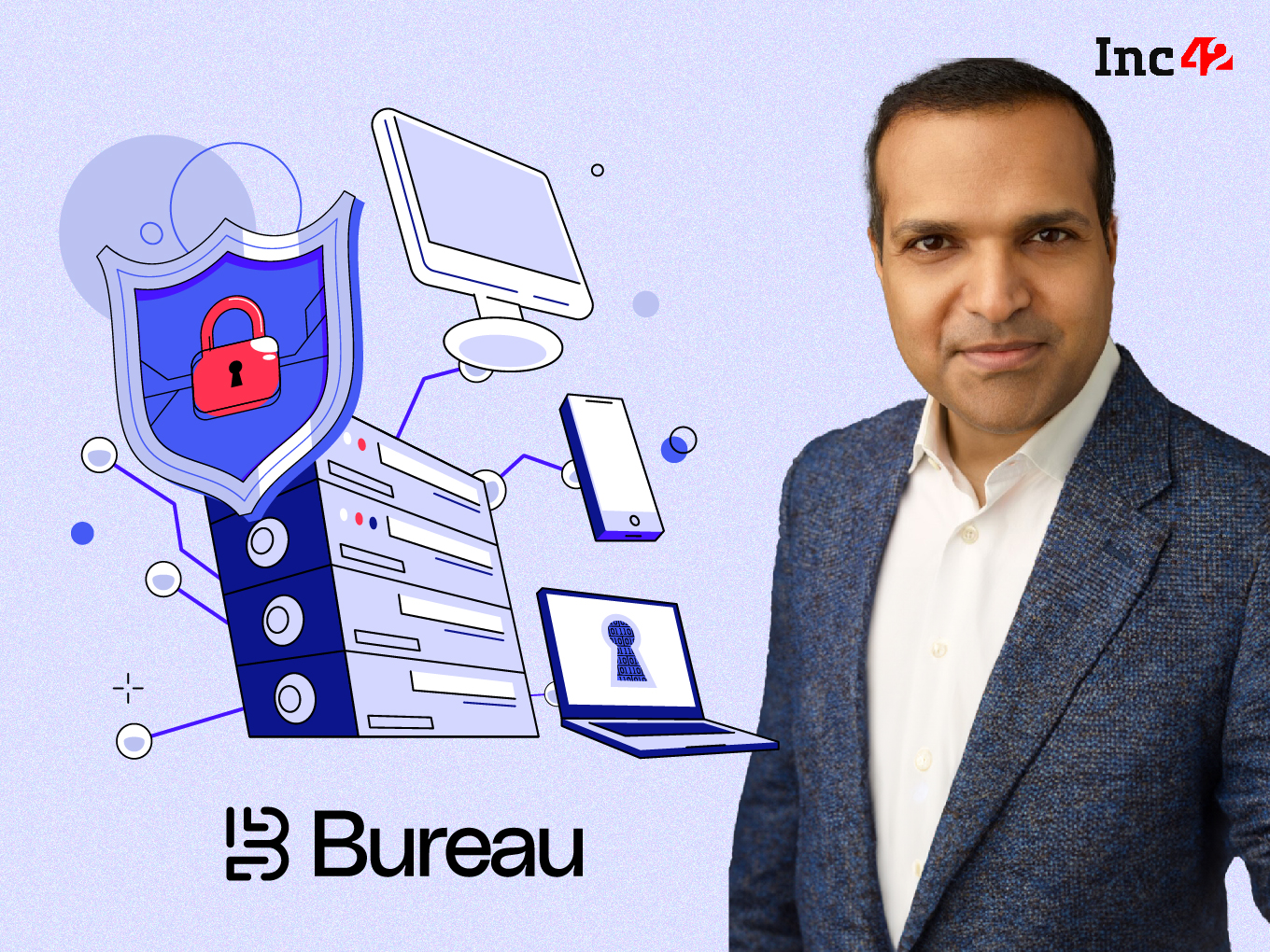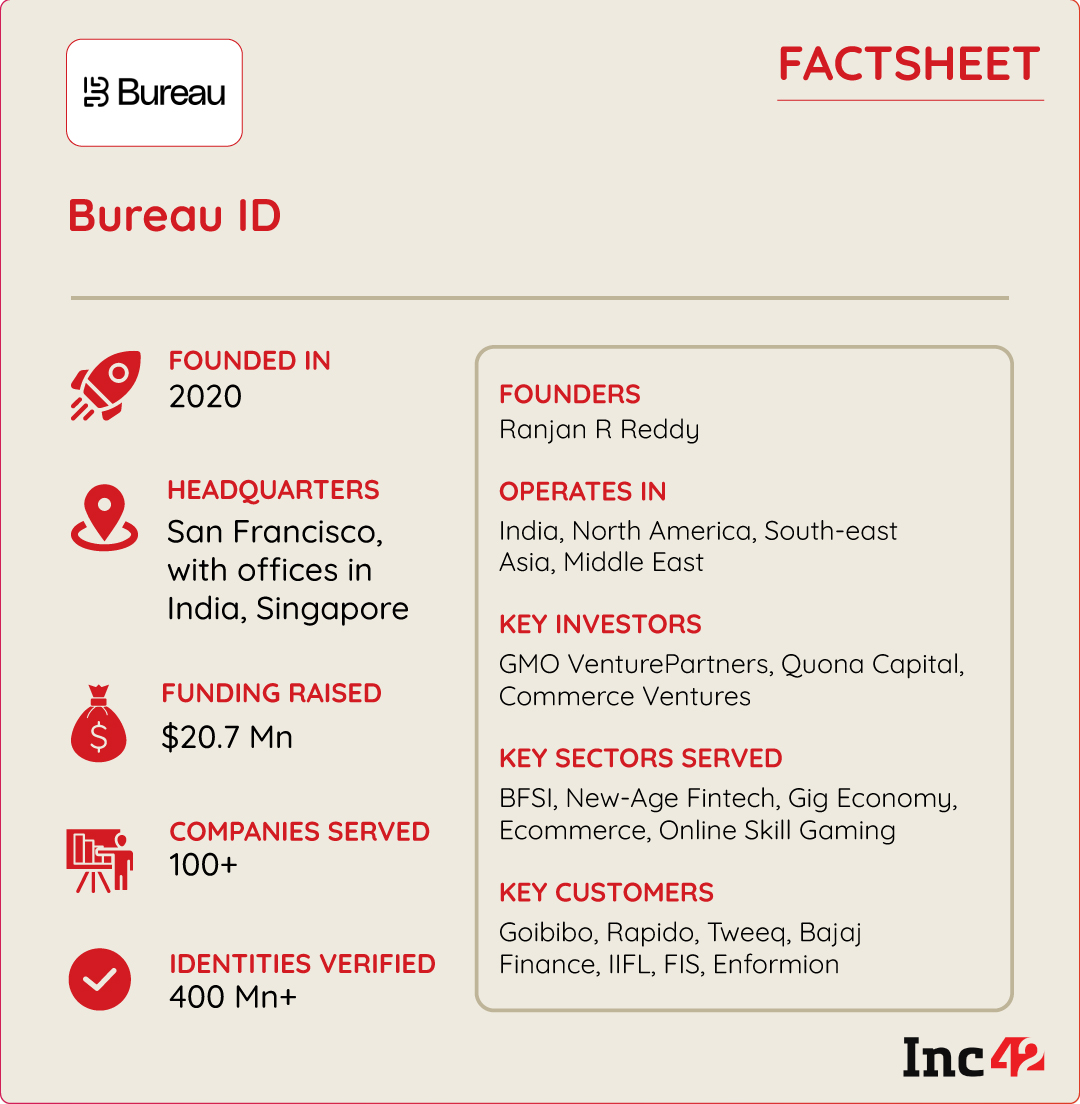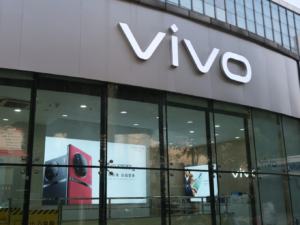SUMMARY
GMO VenturePartners-backed Bureau ID helps banks, financial institutions and enterprises with risk intelligence to protect every touchpoint in the customer journey against cyber fraud and compliance risk
Founder and CEO Ranjan Reddy claims Bureau has successfully verified 400 Mn+ identities
The startup acquired digital identity verification and KYC authentication platform inVOID in 2023
In a post-pandemic world, regulated industries and new-age businesses have jumped on the digital bandwagon to optimise reach and maximise profits. Consumers have evolved in sync, happy to access every convenience with a click or a tap. But super-exposure to cyberspace leaves the world increasingly vulnerable to cybercrimes, and businesses, ranging from SMEs to BFSI leaders, tend to suffer the most.
Consider this. Cyber-financial fraud accounted for 77.4% of the cybercrimes in India between January 2020 and June 2023, per a survey by the Future Crime Research Foundation (FCRF). A 2023 India Threat Landscape report by Cyfirma says startups and SMEs top the ‘most targeted’ list in 2023, while banking and financial services institutions saw 9.5% of all cyberattacks in the last three years. The losses of India Inc. are still not quantified, but globally, cybercrime costs can reach $10.5 Tn annually by 2025, according to industry research and media organisation Cybersecurity Ventures.
As businesses across industry segments, especially those in the financial sector, are compelled to navigate a fast-growing digital minefield, they require cutting-edge financial crime solutions for protection against sophisticated cyberfraud.
To help tackle online fraud at scale, serial entrepreneur Ranjan R Reddy launched the B2B SaaS startup Bureau ID, a global, real-time risk decisioning platform for identity verification, fraud prevention and compliance management in sync with country-specific cybercrime laws and anti-money laundering (AML) checks. It primarily enables banks, fintechs, financial institutions (FIs) and enterprises to fight fraud, and compliance abuse across the customer journey, using its proprietary fraud detection suite.
Using link analysis (examines data connections and relationships for potential fraud) and its predictive AI models, Bureau employs an identity graph to detect fraud networks. This is a critical step when securing a business against use-cases such as fraud rings, money mules and synthetic identity frauds amongs others. Bureau uses its proprietary technology and alternate data points to validate and match digital identifiers to physical identities and analyse their unique behaviour patterns to track anomalies in real-time.
An identity network is thus built over time, securing businesses against cyberfraud throughout users’ life cycles and protecting users when they interact and transact with businesses. Bureau monitors all transactions in real time and provides data insights to companies via a unified dashboard.
The startup’s mission is to provide an all-in-one risk decisioning platform for fraud detection and prevention that ensures digital trust. With its no-code workflows and a single API integration, businesses can validate their customer’s identities, and get continuous fraud monitoring at onboarding, as well as the transaction stage. Reddy claims businesses can reduce fraud by 80% and speed up identity decisioning time by 95% using Bureau solutions.
The startup claims to have serviced organisations worldwide including banks, NBFCs, micro-finance institutions, BaaS platforms and companies in the gig economy, insurance, gaming and payments. Bureau’s customer base spans India, South-east Asia, Middle east and North America. According to Reddy, the startup has successfully verified 400 Mn+ identities and protected over $500m of digital transactions against vulnerabilities to date. Some of Bureau’s customers include US-based FIS Global and Enformian, KSA’s Tweeq and companies like Goibibo, Rapido, Bajaj Finance, IIFL and others from India.
Bureau has raised over $20 Mn since inception, most recently from a clutch of global investors such as GMO VenturePartners, Quona Capital and Commerce Ventures. Noted angel investors, including Mark Britto, EVP-chief product officer at PayPal, and Bobby Mehta, former president and CEO of TransUnion, also supported the cyber fraud prevention platform.
Inside Bureau’s State-Of-The Art Fraud Prevention Offerings
Going by its overarching cybercrime prevention strategy, it is clear that Bureau was not built in a day. For starters, Reddy dedicated much of his career to building and scaling businesses in the mobile payment space. In 2012, he founded Qubecell, a Mumbai-based payments startup, acquired a year later by San Francisco-based mobile payments company Boku. At Boku, a now publicly listed company, he served as chief business officer in his last leadership role.
Reddy elaborated that during his time at the company, he incubated and scaled its identity division which was later sold to Twilio. This experience made him realise that the existing cybersecurity solutions were fragmented and siloed when it came to crucial components like compliance, fraud and security.
“I aspired to build a single platform, with a single API integration, that proactively and holistically monitors identities and transactions against fraud and abuse by providing real-time decisions,” said Reddy.
Hence, Bureau ID was set up in 2020 to accomplish that through its comprehensive fraud detection suite that includes no-code workflows, device intelligence, behavioural AI, compliance APIs, alternate data solutions, visualised through an identity graph.
Regarding the issue of increasing cyberfraud, Reddy stresses that smart identity decisioning should consider how fraudsters use mule accounts to launder stolen money. Money mules are mostly individuals typically recruited by fraudsters to transfer huge sums between accounts and across locations until all links to the eventual receivers are lost (however, some mule accounts are also opened by bots).
As human mules use multiple phone numbers, email IDs, stolen or spoofed identities for these activities, mapping digital and physical identity verifications through alternate data solutions plays a critical role in detecting them, especially when businesses onboard new customers.
Next comes device intelligence, making the procedure more foolproof. Bureau cross-checks device fingerprints, which are unique patterns generated through device configurations and usage. Pitting a device ID/fingerprint against a specific user helps prevent a fraudster from switching devices too frequently. The platform also validates IP addresses, operating systems (to analyse if they are genuine or spoofed), VPN and tracks remote desktop and malware, which are commonly used by mules to bypass security measures.
“Mules open multiple accounts for money transfers from different devices in a very short period. With data intelligence, we can identify anomalous activity,” explained Reddy.
Bureau identifies bots in action and scans user behaviour with behavioural AI tools that look at unique human behaviour patterns such as, typing speed, scrolling patterns, and hesitation percentage to successfully authenticate an identity.
“A criminal using stolen identities to open accounts is unfamiliar with personal data. Hence, the person may display hesitation or rely on copy-pasting to enter account details,” the Bureau CEO said.
Finally, an identity network is created with the help of link analysis. “The risk associated with an identity is assessed based on the type and number of such links while factoring in indications of past fraudulent activities reported by Bureau’s customers,” he added.
Bureau’s no-code solutions can be easily integrated with business backends via API, allowing companies to set up customised security features as easily as dragging and dropping pre-configured blocks created for every step of the customer journey.
According to Reddy, the startup has secured SOC2 compliance, a voluntary compliance standard developed by the American Institute of CPAs (certified public accountants) that specifies how service organisations should manage customer data. More importantly, unlike many data brokers, Bureau does not store personally identifiable information (PII) and only relevant, tokenised insights are generated for identity verification.
The startup has set up a pay-per-API revenue model, where businesses pay for the APIs and workflows tailored to suit their specific needs. It also generates revenue through a fixed monthly/annual platform fee for essential functions like building workflows, transaction monitoring and continuous screening, regardless of API usage.

Tapping Into Investors’ Network For Growth
Although Bureau’s strong value proposition positioned it well in the niche space, raising awareness and onboarding B2B customers proved difficult for the early stage startup. Promotion through digital marketing is a common but costly tactic. What if a startup could capitalise on its investors’ network to expand its customer base? That’s precisely what Bureau did.
The startup recently raised additional capital in a Series A funding round in July 2023. Japan’s GMO VenturePartners (GMO-VP) was the lead investor in this round, and its sister company GMO Payment Gateway, the largest payment service provider in Japan, also pitched in along with existing investors. As part of the Japanese internet conglomerates GMO Internet Group, both firms specialize in fintech investments within the Indo-Pacific region, promoting cross-border innovation. GMO Payment Gateway also runs an AIF in India, providing debt funding to fintech startups.
While the funding helped Bureau enhance its data and AI capabilities, Reddy was more than impressed when his investors stepped in to help with customer acquisition.
Leveraging GMO-VP’s connections, Bureau serviced Jai Kisan, GroMo, OTO, Niro and MobiKwik of its portfolio companies.
“GMO has been an invaluable partner in our journey. Its extensive scale and unique perspective make it an exceptional guide and partner. Bureau has already reaped significant benefits due to its impressive portfolio and network,” he said.
Asked about this holistic hand-holding, Ryu Muramatsu, director and founding partner from GMO-VP said the benefits were mutual. “Digital trust is pivotal for all financial transactions where many challenges originate, especially the upsurge in fraudulent activities. Tackling these hurdles is crucial for the entire fintech sector. That’s why we think Bureau is a significant player [in the identity decisioning space].”
Bureau has reportedly agreed to a strategic partnership with GMO Payment Gateway. Bureau is eyeing expansion across the Middle East and Southeast Asia and aggressively marketing its solutions to increase awareness. It will also cater to more institutional players, especially in the banking sector. This makes ample sense as the BFSI sector remains the primary target for cyberattacks and accounted for more than 70% of the spend on anti-fraud measures in 2022.
To speed up its operations, Bureau completed its strategic acquisition of Delhi-based inVOID in 2023. The digital identity verification and KYC authentication platform typically works with fintechs and FIs.
“This is a timely acquisition as the convergence of new regulations and a sharp uptick in fraud cases in recent years have escalated the demand for robust compliance and risk management solutions,” said Reddy.
The Future Is Now For Fraud Detection Businesses
Globally, the fraud detection and prevention market is estimated to reach $66.6 Bn by 2028 from $27.7 Bn in 2023, growing at a CAGR of 19.1%, a report by MarketsandMarkets says. Although this augurs well for FDP players, businesses are still not looking at the problem in its entirety.
As a Deloitte report points out, most organisations depend on homegrown systems where fraud detection rules are framed on an ‘if-then’ scenario. This logic works well in a structured data environment. However, given the humongous and complex data in circulation, complete automation and advanced AI/ML will be required instead of the traditional logic.
Moreover, organisations still seek use-case-specific solutions or try to integrate authorisation logic in disparate tools instead of opting for a centralised ecosystem. Unless identity decisioning is embedded as a core solution, it cannot secure the end-to-end digital journeys of businesses and their customers in real time.
Reddy seconds this, saying businesses must leverage tools and technologies to champion consumer trust and proactively prevent fraud, instead of waiting for the regulators to introduce and enforce penalties that focus more on compliance.
Currently, Bureau does not face direct competition from Indian players, although startups like HyperVerge and Helloverify exist in niche segments of fraud detection. The platform also holds a distinct advantage with a global presence across three regions.
Nevertheless, there is no shortage of global players in the market, including Bureau ID, New York-based Alloy, London-based Onfido and others that provide comprehensive fraud detection solutions. This also highlights that the West has recognised the need for comprehensive identity verification due to the increasing financial fraud.
Will the homegrown startup ecosystem gear up similarly and emerge as a major FDP hub, catering tailored solutions that align with the unique compliance needs of Indian banks and FIs?








































